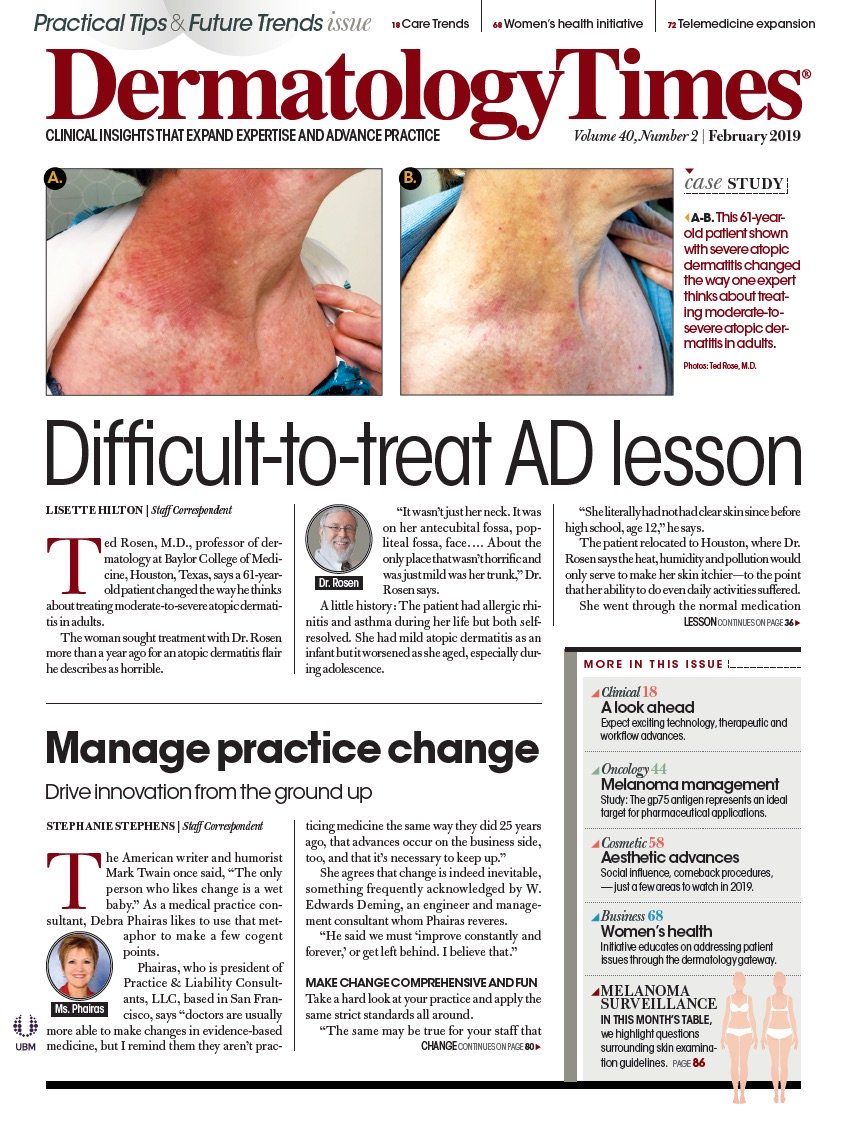
- Acne
- Actinic Keratosis
- Aesthetics
- Alopecia
- Atopic Dermatitis
- Buy-and-Bill
- COVID-19
- Case-Based Roundtable
- Chronic Hand Eczema
- Drug Watch
- Eczema
- General Dermatology
- Hidradenitis Suppurativa
- Melasma
- NP and PA
- Pediatric Dermatology
- Pigmentary Disorders
- Practice Management
- Precision Medicine and Biologics
- Prurigo Nodularis
- Psoriasis
- Psoriatic Arthritis
- Rare Disease
- Rosacea
- Skin Cancer
- Vitiligo
- Wound Care
Publication
Article
Dermatology Times
A patient’s social media posts ruined my reputation
Author(s):
What can you do if a patient slanders your reputation on social media? David J. Goldberg, M.D., J.D., provides his insight in this month's Legal Eagle column.
What can you do if a patient slanders your reputation on social media? David J. Goldberg, M.D., J.D., provides his insight in this month's Legal Eagle column. (wutzkoh - stock.adobe.com)

Dr. Goldberg is director of Skin Laser and Surgery Specialists of New York and New Jersey, past director of Mohs and Laser Research, Icahn School of Medicine at Mt. Sinai; and, adjunct professor of law, Fordham Law School in New York City.

Dr. Derm has been in practice for three decades. He works hard, does no advertising, and does not even have a Facebook page. He is aware of peers who spend an extensive amount on marketing and social media; however he has had no interest. One day he finds out that a disgruntled patient has slandered his reputation on social media. In fact, he has been slandered on Facebook, Instagram, Yelp and Google.
This patient not only accused him of poor medical practice, but also videotaped his staff drinking beer in their nurse’s lounge. Even worse, the video has gone “viral” and has been seen by thousands. Dr. Derm is concerned this malicious act may ruin his career. The internet and social media are nothing more than a curse to Dr. Derm. Is there anything he can do?
Because of privacy laws, unfortunately, a physician has little recourse when an anonymous patient places a scathing review on a website. The reality is that even physician review sites are as likely to misinform as they are to inform. If a patient complains on-line that his surgical excision opened only two days after dermatologic surgery, there is no way for anybody to know whether the patient has performed strenuous exercise. Reviewers of these sites are generally not patients. There are known instances of dentists being accused on-line, by their competitors, of being child molesters. Similarly laudatory on-line comments can be written by the physician himself.
One way to try to work around such frivolous on-line statements is to have patients sign a waiver that has them promise that, in the case they are not happy with their care, they will not post on-line comments to that effect.
The way such contracts are enforceable is as follows: In general, websites acting as platforms for outside commentary are not liable for defamation suits. They are, according to North Carolina neurosurgeon-attorney Jeffrey Segal, subject to copyright laws. Waivers can be written to assign copyright to the treating physician. If the treating physician asks the patient to sign such a “copyright” waiver, the physician can claim ownership of any anonymous review of the practice and demand that such an on-line review then be removed.
There are now examples of website posts removing such deleterious copyrighted comments. Needless to say, not all patients will agree to sign such a waiver. Some may feel such waivers are simply “gag orders”. The reality is that disgruntled patients are free to speak with family, friends, other physicians, lawyers, hospital peer review committees, or credentialing committees. There are a wide range of appropriate and inappropriate places where patients can express their views.
Barring anonymous sites would be ideal. However, barring anonymous sites is unlikely to happen. At the very least it would be ideal if internet sites could verify that the “reviewer” is, in fact, a patient of the physician he or she is criticizing (or praising). Even more, to prevent the extreme opinion – positive and/or negative-from skewing impressions, websites should hold off from posting such reviews until they have at least 10 or more representative views. In an ideal situation reviews should focus on those aspects in which a patient would be expected to be knowledgeable. These would include issues such as waiting time, appropriate parking, or being treated rudely by the physician and/or staff. Commenting on physician technique or results is an entirely different issue.
Without any signed waiver in place, Dr. Derm is in no position to stop his patient from posting the negative on-line comments.














Newsletter
Like what you’re reading? Subscribe to Dermatology Times for weekly updates on therapies, innovations, and real-world practice tips.










2 Commerce Drive
Cranbury, NJ 08512
All rights reserved.





